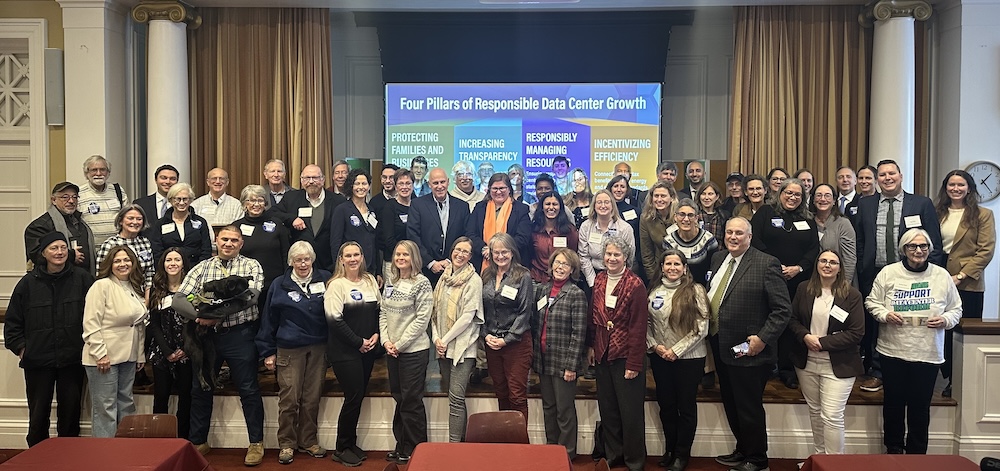In the pre-dawn hours in a Haymarket parking lot, a few dozen people huddled in record cold temperatures as they made their way to the warm glow of a charter bus. Their destination: Richmond. Their mission: convince legislators to enact data center reform during the 2025 General Assembly session.

Our Data Center Reform Platform
As Virginia cities and counties continue to approve more data centers, and transmission lines to serve them follow, the public outcry has brought new communities into the growing Virginia Data Center Reform Coalition. We now represent over 60 nonprofit organizations, homeowner’s associations and communities. The coalition came prepared to the 2025 General Assembly session with a fully fleshed out Data Center Reform Campaign.
Building off of the extensive outreach efforts of The Piedmont Environmental Council and our many partners through the coalition over the past year, we proposed a legislative platform that focused on four pillars of data center reform: 1) enhanced transparency, 2) state oversight, 3) ratepayer protection, and 4) incentives for efficiency. We worked with legislators to draft key bills that address these fundamental reform needs. Unfortunately, most of these bills failed, but the four pillars of reform remain the guiding star for our ongoing efforts.
Outreach and Lobbying Efforts on the Four Pillars
At the beginning of the General Assembly session, Sen. Russet Perry and a group of bipartisan legislators held a press conference to announce their focus on our four pillars of data center reform and five bills they planned to carry forward to implement these pillars. This helped frame the need for data center reform for the General Assembly and the media, which heavily covered the event.
Less than a week later, on Jan. 20, more than 80 people attended the Data Center Reform Coalition’s first independent lobby day to demand action. Attendees met with over 50 legislative offices and shared information with dozens more. Attendees who had previously lobbied in Richmond on this issue in 2023 and 2024 noted that legislators had a much stronger understanding and interest in the issue compared to years past.

This year, the impacts of data centers are hard to ignore. Dominion Energy’s draft Integrated Resource Plan showed over $100 billion of energy infrastructure investment needed to meet the skyrocketing demand. Additionally, the Joint Legislative Audit and Review Commission (JLARC) recently completed a study on data center impacts that made it clear that meeting the energy demand of the data center industry will be extremely challenging and that ratepayers will be subsidizing the infrastructure needed.
Acknowledging growing residential impacts, the JLARC study also described data centers as an “industrial use” not appropriate in residential areas. All too often, localities approve data centers bordering residential areas, harming residents’ quality of life.

Bills Proposed to Implement the Four Pillars of Data Center Reform
To create some level of state oversight, Del. Josh Thomas and Sen. Richard Stuart sponsored two bills — HB 2027 (Thomas) and SB 1448 (Stuart) — that would have required that the State Corporation Commission and the Department of Environmental Quality review large data center applications. Their respective committees felt these bills had unmitigated budgetary impacts and did not advance them.
Companion bills in the Senate and House, SB 1353 (Srinavasan) and HB 2035 (Simonds), could have increased transparency about the energy and water use of existing data centers. Unfortunately, the House Labor and Commerce Committee and the Senate Finance Committee felt that such disclosures were a national security risk and thus dropped these bills, as well.
Sen. Creigh Deeds and Del. Richard Sullivan sponsored bills — SB 1196 (Deeds) and HB 2578 (Sullivan) — to tie the state tax exemption for data centers (which has reached $1 billion annually) to energy efficiency and sustainability standards. These bills did not make it out of committee.
Finally, multiple representatives brought ratepayer protection bills — HB 2101 (Lopes-Maldonado) and SB 960 (Perry) — that would have protected residents and businesses from subsidizing the data center industry’s energy infrastructure. The House Labor and Commerce Committee defeated HB 2101 with little discussion or explanation.
Only SB 960 (Perry), the ratepayer protection bill, and HB 1601 (Thomas), a transparency bill, passed both the House and Senate.
Where are we now?
Only five of the 30 data center reform bills we advocated for survived their respective chambers and passed the House and Senate:
SB 960 (Perry) / HB 2084 (Shin)
SB 960 and HB 2084 went into conference, but the committee did not the accept stronger language of SB 960 requiring the SCC to determine if residential ratepayers and other businesses are subsidizing the energy infrastructure needs of the data center industry. Rather than accept weak language, Sen. Perry chose to pull her bill. HB 2084 passed with the weakened language that does not empower the SCC to do anything new.
HB 1601 (Thomas) / SB 1449 (Ebbins)
These bills went into conference and were combined. They would: 1) require sound profiles for facilities using over 100 MW of power; 2) allow localities to require site assessments to examine effects on water and agricultural resources, parks, historic sites and forests; and 3) require that, prior to local consideration, utility companies review and describe any substations and transmission voltage that would be required if the data center application were approved.
SB 1047 (Roem)
This bill was amended to require the Virginia Department of Energy, in consultation with the SCC, to evaluate potential energy demand response programs and ensure programs are cost effective and do not result in increased local air pollution through the use of fossil fuel generators.
The House- and Senate-approved budget also includes funding for the Joint Subcommittee on Tax Policy to study the benefits of data center tax exemptions and review the JLARC recommendations on how exemptions could be used to incentivize better data center development. Unfortunately, the budget also included a $15 million handout to Pulaski County for road extensions, grading, and natural gas pipeline extensions to support the construction of a data center and power plant.
Next Steps
The ultimate success or failure of these bills will depend on the governor, who holds the veto pen over any approved bills and the budget.
Although disappointed that legislators failed to take more action on data center reform, we did get some important bills nearly to the finish line. We have made this one of the biggest issues of the session and plan to maintain this momentum into 2025 by continuing media outreach, speaking at conferences and community meetings, participating in upcoming SCC cases, and tracking and commenting on associated energy, water, and air quality impacts at both the local and regional level.
This article appeared in the 2025 Spring edition of The Piedmont Environmental Council’s member newsletter, The Piedmont View. If you’d like to become a PEC member or renew your membership, please visit pecva.org/join.
